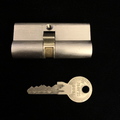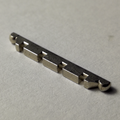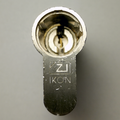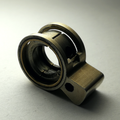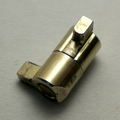IKON TK5: Difference between revisions
(disassembly of TK5 not standard -- puzzle cam instructions added) |
m (images of cam components) |
||
| Line 48: | Line 48: | ||
IKON TK5 shell-Reinder.png |TK5 Euro profile cylinder housing. | IKON TK5 shell-Reinder.png |TK5 Euro profile cylinder housing. | ||
IKON TK5 cam-Reinder.png |A cam from an TK5 Euro profile cylinder. | IKON TK5 cam-Reinder.png |A cam from an TK5 Euro profile cylinder. | ||
File:IKON TK5 cam and sidepanel-Reinder.jpg |A cam with a side plate. | |||
File:IKON TK5 cam parts Reinder.jpg |Cam inner plates. | |||
File:IKON TK5 cam inner parts-Reinder.png |Cam inner plates. | |||
File:IKON TK5 clutch-Reinder.png |The cam clutch. | |||
File:Ikon_TK5_RKS_keycard.jpg|Security card. | File:Ikon_TK5_RKS_keycard.jpg|Security card. | ||
</gallery></div> | </gallery></div> | ||
Revision as of 21:53, 13 January 2023
IKON TK5
| IKON TK5 | |
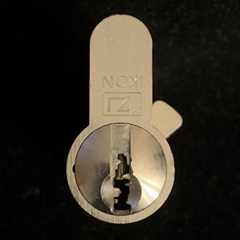 | |
| Name | IKON TK5 |
|---|---|
| Manufacturer | IKON |
| Lock Type | Cylinder |
| Lock Design | Pin-tumbler, Sidebar |
| Specifications | |
| # of Components | 9 |
| Component Type | Pin-tumbler |
The TK5 is a pin-tumbler lock made by the German company IKON. The key bow bears the mark of Bo Widén.
Principles of operation
The TK5 cylinder contains five traditional pin-tumbler stacks. It also utilizes four spring-biased finger pins, that must be lifted and rotated to align with the sidebar, in order for the plug to turn.
Disassembly instructions
The IKON TK5 is disassembled much like other euro profile cylinders, with some care for the sidebar and finger pins during disassembly.
The IKON TK5 has a multiple component cam piece that is disassembled before the plug can be removed. To access the cam components, rotate the cam until a hole in the side of the cam is revealed, and insert a tool to press the spring-biased retainer inside. At the same time, pry away the side plates of the cam. The inner two plates can then be removed, allowing the plug to slide through the cylinder housing.
A pinning shoe, used with a modified key, is a common method for removing the plug from a Euro profile cylinder. One plug is rotated 180 degrees either clockwise or counter-clockwise, and the pin retainer inserted into the edge of the keyway. This allows the plug to be removed while preventing the driver pins and springs from escaping the cylinder housing. As an alternative method, a segmented plug follower could be used.
Gallery
See also
| This article is a stub. You can help Lockwiki by expanding it. |



